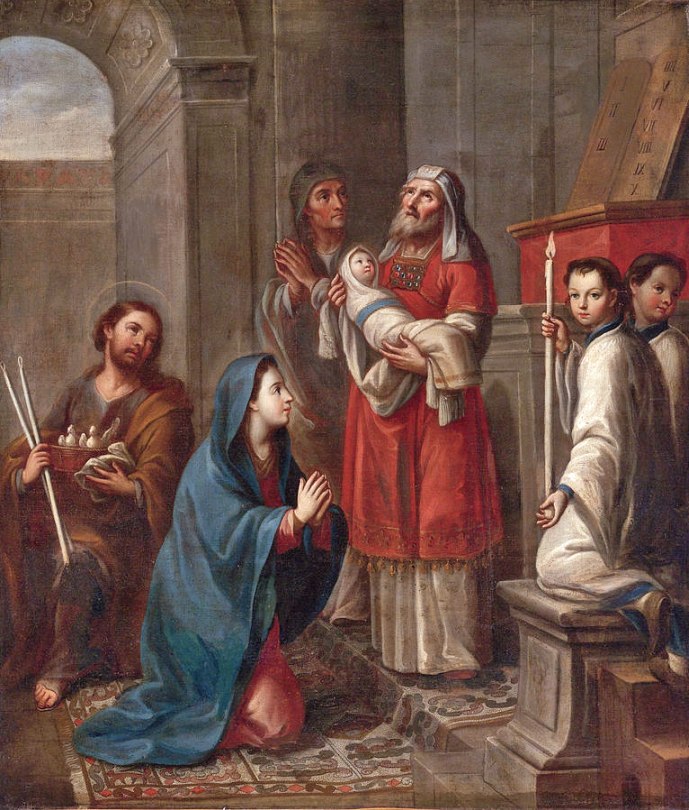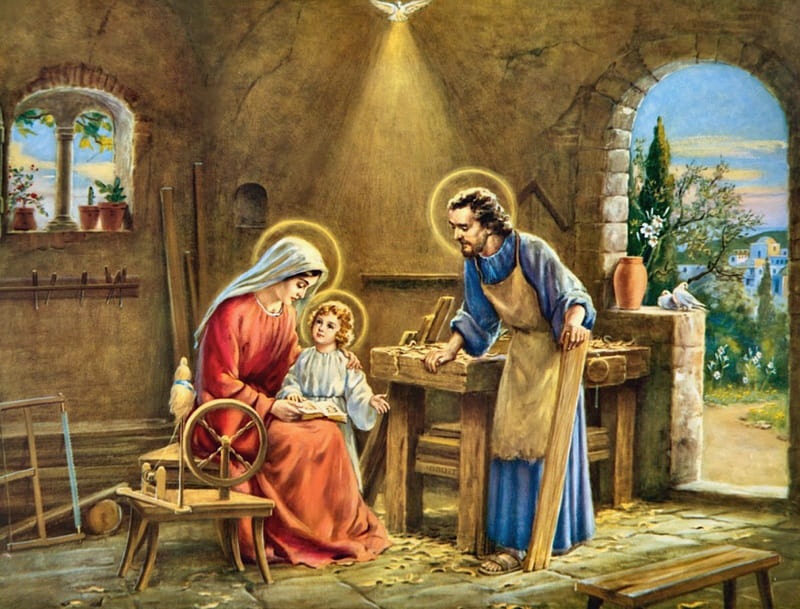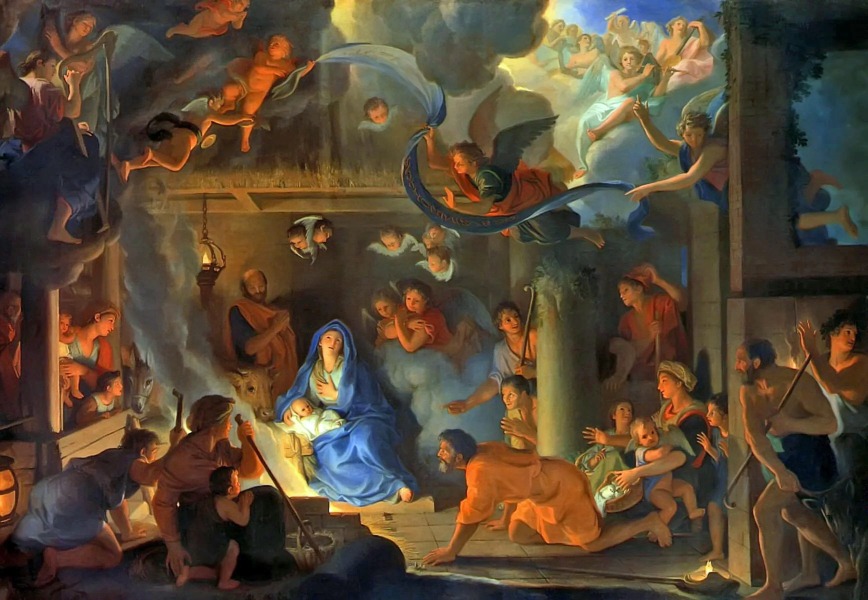 In the Collect the Church prays to be directed by that divine rule which was taught us by our Savior, Who shone upon us in order to
enlighten and guide our steps in the path of good works.
In the Collect the Church prays to be directed by that divine rule which was taught us by our Savior, Who shone upon us in order to
enlighten and guide our steps in the path of good works.(If December 30 falls on Monday or Saturday, it is called the Sixth Day of the Christmas Octave, and the Mass and Office are based on Christmas. If it falls on any other day of the week, then the Mass and Office are of the Sunday Within the Octave of Christmas.)
December 30 is the only day within the Christmas Octave which is not a Saint's Feast. During the Octaves of Epiphany, Easter, and Pentecost, the Church is so absorbed in the respective mysteries that She puts off everything that could share Her attention; whereas during this of Christmas, there is only one day which does not celebrate the memory of some glorious Saint, and our Infant Jesus is surrounded by a choir of heroes who loved and served Him. Thus the Church, or more correctly, God – for God is the Author of the Liturgical Cycle of the year – shows us how the Incarnate Word, Who came to save mankind, desires to give mankind confidence by this His adorable familiarity.
We have already shown (in Issue No. 166) that the Birth of Our Lord is traditionally held to have taken place on a Sunday, the Day on which, in the beginning of the world, God created Light. We shall find, later on, that His Resurrection also was on a Sunday. This, the first day of creation and the first of the week, was consecrated by the old Pagans to the Sun; with us Christians, it is most sacred and holy, on account of the two risings of our Divine Sun of Justice – His Birth and His Resurrection. Whilst the solemnity of Easter is always kept on a Sunday, that of Christmas falls by turns on each of the days of the week – we have already had this difference explained to us by the Holy Fathers: but the mystery of Jesus’ Birth is more aptly and strongly expressed, when its anniversary falls on a Sunday. In other years, when the coincidence does not happen, the Faithful will at least be led by their Christian instincts to give especial honor to the day within the Octave which falls on the Sunday. The Church has honored it with a proper Mass, which we will now examine.
It was at midnight that the Lord delivered His people from bondage, by the Passage of His destroying Angel over the land of the Egyptians: so also was it in the still hour of midnight that Jesus, the Angel of Great Counsel, came down from His royal throne, bringing mercy to our earth. It is just that whilst commemorating this second Passage, the Church should sing the praises of Her Emmanuel, Who comes, clad in His strength and beauty, to take possession of His Kingdom.
Introit (Wis. 18: 14-15) While all things were in quiet silence, and the night was in the midst of her course, Thy Almighty Word, O Lord, leapt down from Thy royal throne. (Ps. 92: 1) The Lord has reigned, He is clothed with beauty: the Lord is clothed with strength, and has girded Himself. V. Gloria Patri.
 In the Collect the Church prays to be directed by that divine rule which was taught us by our Savior, Who shone upon us in order to
enlighten and guide our steps in the path of good works.
In the Collect the Church prays to be directed by that divine rule which was taught us by our Savior, Who shone upon us in order to
enlighten and guide our steps in the path of good works.
Collect O Almighty and Eternal God, regulate our actions according to Thy divine will: that in the name of Thy Beloved Son, we may abound in good works. Who liveth and reigneth with Thee...
Lesson of the Epistle of St. Paul the Apostle to the Galatians (4: 1-7). Brethren: As long as the heir is a child,
he differs in no way from a slave, though he is the master of all; but he is under guardians and stewards until the time set by his father.
So we too, when we were children, were enslaved under the elements of the world. But when the fullness of time came, God sent His Son,
born of a Woman, born under the Law, that He might redeem those who were under the Law, that we might receive the adoption of sons.
And because you are sons, God has sent the Spirit of His Son into our hearts, crying,
Abba, Father.
So that he is no longer a slave, but a son; and if a son, an heir also through God.
The Child that is born of Mary and is couched in the Manger at Bethlehem, raises His feeble voice to the Eternal Father, and calls Him, My Father! He turns towards us and calls us My Brethren! We, consequently, when we speak to His Father, may call Him Our Father! This is the mystery of adoption, revealed to us by the great event we are solemnizing. All things are changed, both in Heaven and on earth: God has not only one Son, He has many sons; henceforth we stand before this our God, not merely creatures drawn out of nothing by His power, but children that He fondly loves. Heaven is now not only the throne of His sovereign Majesty; it is become our inheritance, in which we are joint-heirs with our Brother Jesus, the Son of Mary, Son of Eve, Son of Adam, according to His Human Nature, and (in the unity of Person) Son of God according to His Divine Nature. Let us turn our wondering and loving thoughts first to this sweet Babe, that has brought us all these blessings, and then to the blessings themselves, to the dear inheritance made ours by Him. Let our minds be seized with astonishment at creatures having such a destiny! Then let our hearts pour out their thanks for the incomparable gift!
Gospel (Luke 2: 33-40) At that time, Joseph and Mary, the Mother of Jesus, were marveling at the things
spoken concerning Him. And Simeon blessed them, and said to Mary His Mother, Behold, this Child is destined for the fall and for
the rise of many in Israel, and for a sign that shall be contradicted. And Thy own soul a sword shall pierce, that the thoughts
of many hearts may be revealed.
There was also Anna, a fastings and prayers worshipping night and day. And coming up at that
very hour, she began to give praise to the Lord, and spoke of Him to all who were awaiting the redemption of Israel. And when they
had fulfilled all things prescribed in the Law of the Lord, they returned to Galilee, into their own town of Nazareth. And the Child
grew and became strong. He was full of wisdom and the grace of God was upon Him.
The passage of the Gospel selected for this Mass, though bearing on the Divine Infancy, yet gives us, we may almost say prematurely, the terrible prophecy of Simeon regarding the dear Babe of Bethlehem. The Heart of Mary, that was overflowing with joy at the miraculous Birth of Her Child, is here made to feel the sword spoken of by the venerable Priest of the temple. Her Son, then, is to be but a sign that shall be contradicted! The mystery of man's adoption by God is to cost this Child of Hers His life! We that are the Redeemed in His Blood, we may not yet dwell on the fatigues and the Passion and the Death of our Emmanuel – the time will come for that; at present we will think of Him as the sweet Child that is born to us, the source of all our happiness by His having come among us. Let us catch up the words of Anna, who calls Him the Redemption of Israel. Let our eyes delight in the sight of the earth regenerated by the birth of its Savior. Let us admire and study well this Jesus newly born among us, and adore in humble love the wisdom and grace that are in Him.
 During the Offertory, the Church celebrates the wonderful renovation wrought in the world, a renovation which saves it from destruction.
She sings the praises of the great God Who came down into the poor Stable of Bethlehem, yet left not His eternal throne.
During the Offertory, the Church celebrates the wonderful renovation wrought in the world, a renovation which saves it from destruction.
She sings the praises of the great God Who came down into the poor Stable of Bethlehem, yet left not His eternal throne.
Offertory (Ps. 92: 1-2) God has established the world, which shall not be moved: Thy throne, O God, is prepared from old; Thou art from everlasting.
The words chanted by the Church at the Communion are those spoken by the Angel to St. Joseph, after the exile of the Holy Family in Egypt. She has given this Divine Infant to Her faithful children in Holy Communion, in order that they may carry Him in their hearts, and bids them guard Him against the snares laid for Him by His and their enemies. Let the Christian, therefore, take heed lest Jesus should be taken from him. Let him, by strict watchfulness and by good works, crush the tyrant – sin – that seeks the life of the Divine Guest of his soul. It is for this reason that, in the Postcommunion, the Church prays that our vices may be destroyed, and our desires for a virtuous life be blessed.
Communion (Matth. 2: 20) Take the Child and His Mother, and go into the land of Israel, for those who sought the Child's life are dead.
Postcommunion By the working of this mystery, O Lord, may our sins be purged, and our just desires fulfilled. Through Our Lord Jesus Christ...
December 30 is the sixth day of the Octave of the Nativity. Let us consider how the Divine Infant lies in the Crib of the Stable, and is warmed by the breath of the Ox and the Ass, as Isaias had foretold: The ox knoweth his owner, and the ass his master's crib; but Israel hath not known Me (Isa. 1: 3). Thus does the great God enter that world which His own hands have created! The dwellings of men are refused Him, for man has a hard heart for his God, and an indifference which is a real contempt. The only shelter he can find to be born in is a Stable; and that necessitates His coming into the world in the company of poor brutes.
At all events, these animals are His own work. When He created the irrational world of living things, He subjected it, as the inferior part of creation, to man; and man was to ennoble it, by referring it to the Creator. When Adam sinned, this subjection, this harmony, was broken. The Apostle teaches us that the brute creation is not insensible to the degradation thus forced upon it by sinful man: For the eager longing of creation awaits the revelation of the sons of God. For creation was made subject to vanity – not by its own will, but by reason of Him Who made it subject... For we know that all creation groans and travails in pain until now (Rom. 8). It obeys him with reluctance; it not infrequently rebels against and deservedly punishes him; and on the day of judgment it will take the side of its Creator, and avenge itself of that wickedness of which man has made it the unwilling instrument: And He will sharpen His severe wrath for a spear, and the whole world shall fight with Him against the unwise (Wis. 5: 21).
In the mystery of His Birth, the Son of God visits this part of His creation; men refused to receive Him, and he accepts the hospitality of the dwelling of brutes. It is from their dwelling that He begins the divine career of the three and thirty years. The first human beings He invites into the company of His Blessed Mother and his dear St. Joseph, the first He admits into the Stable to see and adore Himself, are shepherds, who were busy watching their flocks, and whose simple hearts have not been corrupted by the atmosphere of the cities.

The Ox – which, as we learn from Ezechiel (1: 10) and St. John (Apoc. 4: 7), is one of the symbolic creatures standing round God's throne – is the figure of the sacrifices of the Old Law. The blood of oxen has flowed in torrents upon the altar of the Temple: it was the imperfect and material offering prescribed to be made to God, until He should send the true Victim. The Infant Jesus, Who lies in the Crib, is that Victim, and St. Paul tells us what He says to His Eternal Father: Sacrifices and Oblations and Holocausts for sin Thou wouldst not have, neither are they pleasing to Thee... Then said I: Behold, I come... (Heb. 10: 8-9).
The Prophet Zachary (Zach. 9: 9, quoted by Matt. 21: 5), foretelling the peaceful triumph of the Meek King, says that He will make His entry into Sion riding upon an Ass. We shall assist, further on in the year, at the accomplishment of this prophecy. Now that we are at Bethlehem, in our Christmas mystery, let us observe how the Heavenly Father places His Divine Son between the instrument of his peaceful triumph and the symbol of His Sacrifice on Calvary.
Ah, dear Jesus, Creator of Heaven and earth, how strange is this Thy entrance into Thine own world! The whole universe should have given Thee a welcome of love and adoration; and yet what motionless indifference! Not one house to take Thee in! Men buried in sleep! And when Mary had placed Thee in the Crib, Thy first sight was that of two poor animals, the slaves of him who proudly rejected Thee! Yet this sight did not displease Thee, for Thou dost not despise the work of Thy hands. What afflicts Thy loving Heart is the presence of sin in our souls, the sight of that enemy of Thine which has so often caused Thee to suffer. Oh, hateful sin! We renounce it, and wish, dear Jesus, to acknowledge Thee for our Lord and Master, as did the Ox and Ass. We will unite in that hymn of praise which creation is ever sending up to Thee, by henceforth adding to it the homage of our adoration and gratitude; nay, we will lend speech to nature, and give it soul, and sanctify it, by referring all creatures to Thy service.
NEW: Alphabetical Index
Contact us: smr@salvemariaregina.info
Visit also: www.marienfried.com